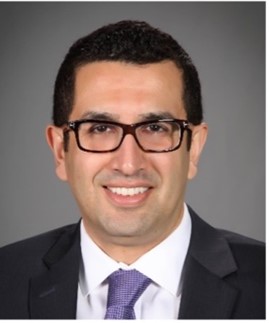Wed, 25 May, 00:30 - 01:30 UTC
Roozbeh Jafari, Texas A&M University, USA
Chair: Saeid Sanei, Nottingham Trent University, UK.

The bold vision of pervasive physiological monitoring, through proliferation of off-the-shelf wearables that began a decade ago, has created immense opportunities for precision medicine outside clinics and in ambulatory settings. Although significant progress has been made, several unmet needs remain; Lack of availability of advanced wearable sensing paradigms, noisy wearable data and labels in ambulatory settings, the unknown circumstances surrounding data capture in wearable paradigms, heterogeneity of the users both in terms of physiological and behavioral states, and often limited view into the user’s physiological state prevent extraction of actionable information.
This seminar presents several topics that coherently articulate on the vision and the opportunities of practicing “medicine in the wild” using wearables. We will present advanced wearable sensing paradigms including cuffless blood pressure monitoring using a miniaturized array of bio-impedance sensors combined with AI-assisted calibration-free techniques to extract blood pressure with clinical grade accuracy. In addition, we will explore the need for generalizable and customizable models resembling digital twin paradigms that can assist with such measurements and information extraction. The nature of noise on various wearable data modalities will be discussed and several signal processing techniques to address the noise, including particle filters and combinatorial algorithms will be discussed. Probabilistic and context-aware machine learning algorithms that can further combat the issue of noise and external undesirable confounders will be presented. These algorithms are well-suited to identify minor and yet important trends correlated with the user’s physiological states. Lastly, we will present personalization techniques at the level of data and machine learning/AI, that will enhance the ability to extract actionable information in the context of several real-world applications.
Digital health and wearables will play a significant role in the future of medicine outside clinics. The future directions present opportunities both in short-term translational research efforts with direct influence on clinical practice as well as long-term foundational development of theories and computational frameworks combining human physiology, physics, computer science, engineering, and medicine, all aimed at impacting the health and wellbeing of our communities.
Roozbeh Jafari (http://jafari.tamu.edu) is the Tim and Amy Leach Professor of Biomedical Engineering, Computer Science and Engineering and Electrical and Computer Engineering at Texas A&M University. He received his Ph.D. in Computer Science from UCLA and completed a postdoctoral fellowship at UC-Berkeley. His research interest lies in the area of wearable computer design and signal processing. He has raised more than $86M for research with $23M directed towards his lab. His research has been funded by the NSF, NIH, DoD (TATRC), DTRA, DIU, AFRL, AFOSR, DARPA, SRC and industry (Texas Instruments, Tektronix, Samsung & Telecom Italia). He has published over 200 papers in refereed journals and conferences. He has served as the general chair and technical program committee chair for several flagship conferences in the areas of wearable computers. Dr. Jafari is the recipient of the NSF CAREER award (2012), IEEE Real-Time & Embedded Technology & Applications Symposium best paper award (2011), Andrew P. Sage best transactions paper award (2014), ACM Transactions on Embedded Computing Systems best paper award (2019), and the outstanding engineering contribution award from the College of Engineering at Texas A&M (2019). He has been named Texas A&M Presidential Fellow (2019). He serves on the editorial board for the IEEE Transactions on Biomedical Circuits and Systems, IEEE Sensors Journal, IEEE Internet of Things Journal, IEEE Journal of Biomedical and Health Informatics, IEEE Open Journal of Engineering in Medicine and Biology and ACM Transactions on Computing for Healthcare. He is currently the chair of the IEEE Wearable Biomedical Sensors and Systems Technical Committee (elected) as well the IEEE Applied Signal Processing Technical Committee (elected). He serves on scientific panels for funding agencies frequently, served as a standing member of the NIH Biomedical Computing and Health Informatics (BCHI) study section (2017-2021), and is the inaugural chair of the NIH Clinical Informatics and Digital Health (CIDH) study section (2020-2022). He is a Fellow of the American Institute for Medical and Biological Engineering (AIMBE).
